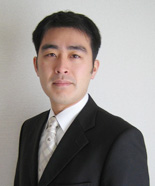Outline of the Laboratory of Information Communication Photonics

Takeshi Fujisawa
graduated from the Laboratory of Information Communication Photonics in the 2005 academic year
I had an interest in the hardware aspect (equipment actually used for communications) of the information communication field, which can connect people. I wanted to know how theories in textbooks are implemented in the real world.
Q1What did you learn in the laboratory? What do you think is helpful for your current job?
I am now engaged in research and development of optical communication equipment at a private company’s research institution. In-depth specialized knowledge as well as extensive basic academic skills from mathematics to physics are indispensable to achieve results at the frontier of research and development.
In the disciplines related to information electronics at Hokkaido University, balanced curriculums covering a broad range of fields such as mathematics, physics, applied physics and information are provided. I was able to acquire basic academic skills in the extensive discipline of “information science,” and to experience the frontier of the respective fields through lectures, and could then decide on a specialized field to pursue in the future.
After I was accepted at this laboratory in my fourth year as an undergraduate, I set a research theme under the guidance of my advisor, and through that research, I acquired specialized knowledge and skills (experimental technology, programming technology, etc.). These technologies are directly helpful at the scene of research and development. For people aiming at careers involving advanced technologies, this is a great place to learn highly practical technologies.
To proceed with research, however, only basic academic skills and some specialized technologies are not sufficient, and the creative ability of coming up with new ideas is required. This ability is now most helpful in my current job (although it’s not sufficient), and I think it will be even more necessary in the future regardless of the job type. To acquire such ability, one has to join a laboratory where cutting-edge research is conducted under the guidance of researchers at the frontier of the field, and enhance one’s ability through discussions. I received guidance from many renowned professors at Hokkaido University, and also had many opportunities to make presentations at conferences and join in discussions with people from other research institutions. I not only acquired knowledge and skills, but also a general ability to live in the information science field.
Q2Why did you choose this division and this laboratory?
While studying as an undergraduate, I had an interest in the hardware aspect (equipment actually used for communications) of the information communication field, which can connect people. I wanted to know how theories in textbooks are implemented in the real world. As the phrase “age of light” is often mentioned, I got especially attracted to equipment that transmit information using light (optical fibers, laser, etc.). I wanted to know what they are like inside, by what principle they work and what is researched on the frontiers of this field, and strongly hoped to join this frontier. This is why I went on to the Division of Media and Network Technologies, where in-depth knowledge of telecom equipment and methods can be acquired, and joined the Laboratory of Information Communication Photonics (Professor Masanori Koshiba, Associate Professor Kunimasa Saitoh), which has achieved remarkable results in the field of optoelectronics. The laboratories in the Division of Media and Network Technologies have a cozy atmosphere, and I could freely consult with professors and other lecturers and led a very meaningful college life.
Q3Your future goal and a message for your juniors
My future goal is to commercialize the optical communication device I researched and developed, and to contribute to building the optical communication infrastructure. Through this process, I hope to interact with researchers in Japan and overseas, publish my research results, contribute to academic societies, and grow into a global researcher.
Hokkaido University’s liberal school spirit is very suitable for people wishing to become researchers who have to develop unique ideas and consider things carefully. With the explosive spread of the Internet, fields related to information science have rapidly expanded, both in terms of software and hardware. I think these fields will be studied even more extensively from various aspects and thus grow. Why don’t you jump into the frontier of 21st century information science at Hokkaido University?

